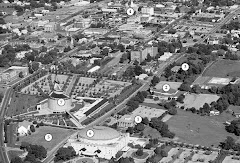 We all view the world through the lenses of our values and beliefs. Some of our values and beliefs may be well established while others may be in a more infant stage of development. These values and beliefs are developed over time by our personal experiences as well as the knowledge imparted to us through sources we trust. These sources may include individual personal relationships developed in the family, as well as influences from school, work, community or church. Over time these values become entrenched in us so much that many of our subconscious decisions dictate the course of our lives. If our values are based on truth, we’re in great shape, but if they are based on bigotry, falsehoods or half-truths our lenses will be blurred and our vision will be inaccurate. If our lenses are based on truth they will be clear and the paradigm through which we view the world will be accurate.
We all view the world through the lenses of our values and beliefs. Some of our values and beliefs may be well established while others may be in a more infant stage of development. These values and beliefs are developed over time by our personal experiences as well as the knowledge imparted to us through sources we trust. These sources may include individual personal relationships developed in the family, as well as influences from school, work, community or church. Over time these values become entrenched in us so much that many of our subconscious decisions dictate the course of our lives. If our values are based on truth, we’re in great shape, but if they are based on bigotry, falsehoods or half-truths our lenses will be blurred and our vision will be inaccurate. If our lenses are based on truth they will be clear and the paradigm through which we view the world will be accurate.The problem is, few of us ever think we’re wrong. We may admit to the occasional error, but it’s unlikely we would admit to a faulty worldview. For example, if I thought my conservative political viewpoints were incorrect, I wouldn’t be a conservative. I would consciously search out a different philosophy around which I would structure my belief system. But based on my personal experience and the knowledge imparted to me by the people and institutions I trust, I find myself generally satisfied with the conservative political philosophy so I am not willing to discard it, although I may be willing to accept failures within my paradigm. Despite my confidence in my worldview it is important to refresh my vision or clear the lenses as I challenge my core values. As I challenge my own views, those which are based in truth will be strengthened and my confidence will increase, while those that cannot hold up to scrutiny will be discarded and replaced with a more complete truth.
It has always been interesting to me how good, intelligent people can disagree about the most basic things I would consider to be fact. Do tax cuts stimulate the economy? In my mind the answer is a no-brainer. Of course they do. My knowledge and experience tells me they do, while the knowledge and experience of others tell them that tax cuts are selfish and not helpful in stimulating the economy. Am I that much smarter than others? Yes, I am. OK, just kidding- kind of. But I listen to Republicans and Democrats discuss political issues and it often seems that they’re arguing for the sake of arguing. Undoubtedly this is true in many cases, but I think it is highly possible that both sides truly believe what they are saying. The paradigm through which they are viewing the world is vastly different from each other.
It is also interesting to me to view or hear the sentiments of our older generations when it comes to race relations. Sometimes I will hear a comment or a word, or see an action, which to me seems inappropriate or bigoted. The individual who uttered the statement thinks nothing of it. Perhaps it’s a phrase or word they used as a child when such things were common and considered politically correct. Have we ever seen or heard such things from grandparents or great grandparents? Are they bad people? No. They would argue vehemently that there is no racism in their heart and I believe them. But the experiences of growing up in a different time, when the cultural norms and correctness were different, may color the lenses through which they view the world.
Sometimes, as members of the church, we think of our doctrine and think, “of course, it makes perfect sense. How could anyone refute this belief.” Or “how could a person claim we are not Christian when our church bears His name”. To our thinking based on the spiritual paradigm we have developed over time, it is difficult to comprehend that a good, honest person could view something 180 degrees differently than we do. Because of our difficulty in understanding this, we may incorrectly assign a motive for the actions of others, which is wrong. Limits in our own worldview make it difficult to understand others and vice versa.
At work or at church I am often challenged to solve problems in operational procedures or staff concerns. I do the best I can to formulate a solution I think will work and when I reach my conclusion I feel satisfied with the answer to my problem. I have found that when I rely solely on my own view, and devise my own plan without the various views and experience of others, my answer, although good, may not be as great as it could have been. By basing my answers solely on my own experiences and knowledge, I eliminate the possibility for something better and remain a prisoner of my own pattern of thinking, my own paradigm.
When Proposition 8 in California passed and protesters targeted the Church, I remember feeling defensive and upset. I viewed the protests as damaging to the reputation of the church and myself personally as a member of the church. When I shifted my mindset to view the protests as an opportunity for the church to share its values to those who may be searching for truth, my defensiveness subsided. Though I still believe the protesters were wrong and petty, I no longer focus on them. I now focus on the missionary opportunities within the community; opportunities only made possible by the protests and I don’t fret the small stuff. This is a very simple example of how I refocused my worldview and shifted my paradigm from the view of a problem to the view of an opportunity.
There is such thing as absolute truth. I wouldn’t be a member of the church if I didn’t believe that. But there are also patterns and paradigms of thinking that can be challenged. Even if our answer to a question is right, there may be another right answer, and it may be better than what we came up with originally. When we are open minded to the thoughts and ideas of others, and try to view the world through the lenses with which they are viewing the world, we do not discard our values and beliefs but rather strengthen those that are correct, and view critically others which may be based falsely on our environment or limited experience.

























